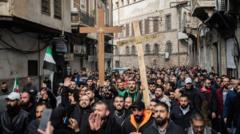Protests erupted in Syria following the burning of a Christmas tree in Suqaylabiyah, a town with a significant Christian population. Footage shared on social media depicted the tree engulfed in flames, instigating outrage among locals who rallied for the protection of minority rights in light of the new Islamist authority, Hayat Tahrir al-Sham (HTS).
HTS, a dominant faction in the uprising that resulted in the fall of President Bashar al-Assad, has pledged to safeguard the freedoms of religious and ethnic minorities. In response to the arson, HTS has detained several foreign fighters allegedly linked to the incident. Videos from the scene revealed masked individuals pouring an unknown substance on the tree, raising questions about their intent.
Following the incident, protests intensified, spreading to the streets of Damascus. Demonstrators voiced their frustrations, particularly targeting foreign fighters, chanting slogans such as "Syria is free, non-Syrians should leave." In the historic Bab Touma neighborhood, one participant expressed his discontent regarding the freedom to practice Christianity, declaring, "If we're not allowed to live our Christian faith in our country, then we don't belong here anymore."
Syria is rich in cultural diversity, home to various ethnic and religious communities—including Kurds, Druze, Alawite Shia, and Christians—but the recent events have called into question their safety and rights. Following the recent transition in leadership, with the Assad family's decades-long rule ending, many displaced individuals have started to return home.
Despite HTS's self-proclaimed shift toward a more pragmatic governance approach, the true extent of their commitment to minority rights remains unclear, especially with different armed groups opposing or ambivalently associated with the faction still present in the country.
Notably, HTS's designation as a terrorist organization complicates their governance strategy. Meanwhile, diplomatic maneuvers appear to reflect a softened stance towards HTS, as evidenced by the recent lifting of a bounty on their leader and ongoing U.S. military operations against rival jihadist groups.
As the new leadership confronts the challenges of governance amidst unrest and a fragmented opposition landscape, the ongoing demands for minority protections highlight the urgency of addressing the needs of Syria's diverse population.


















